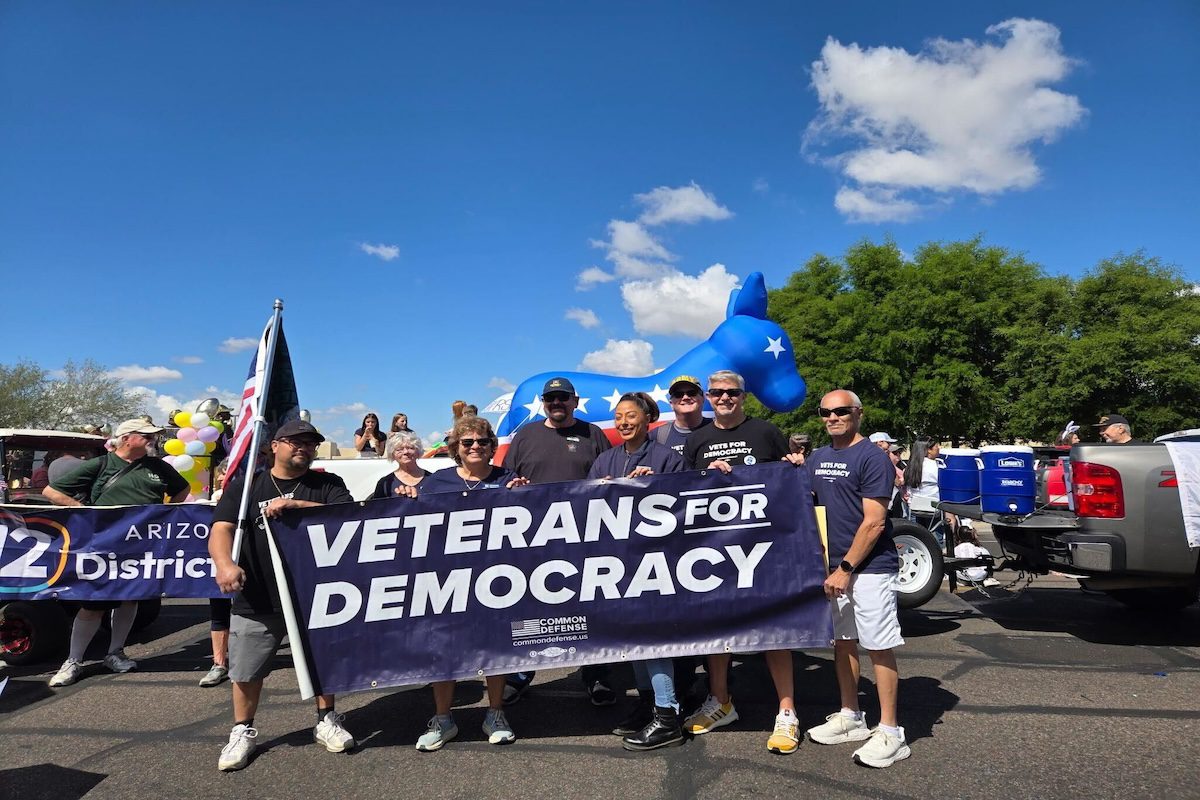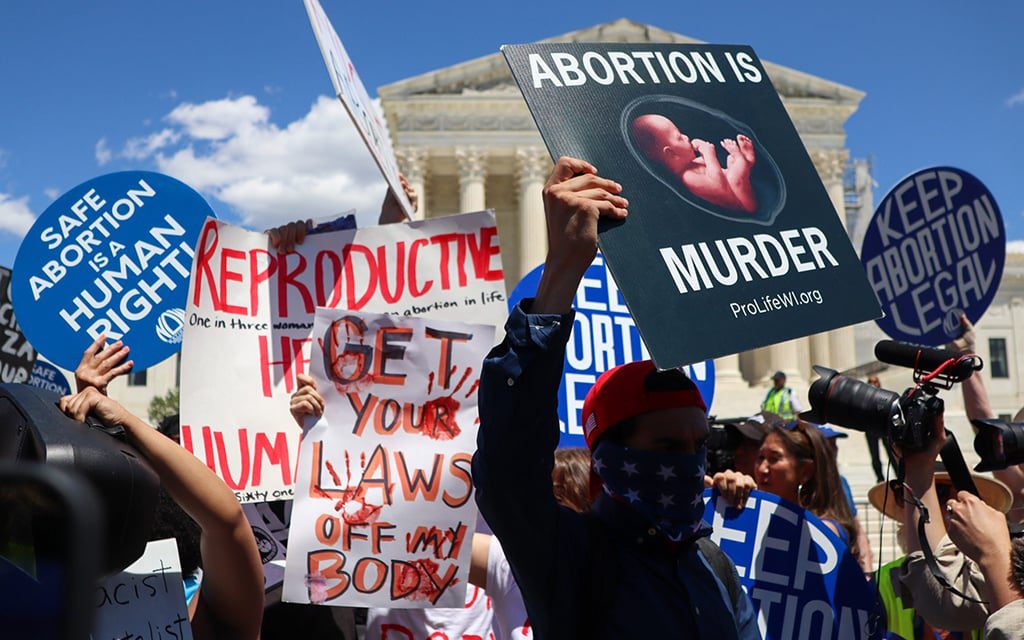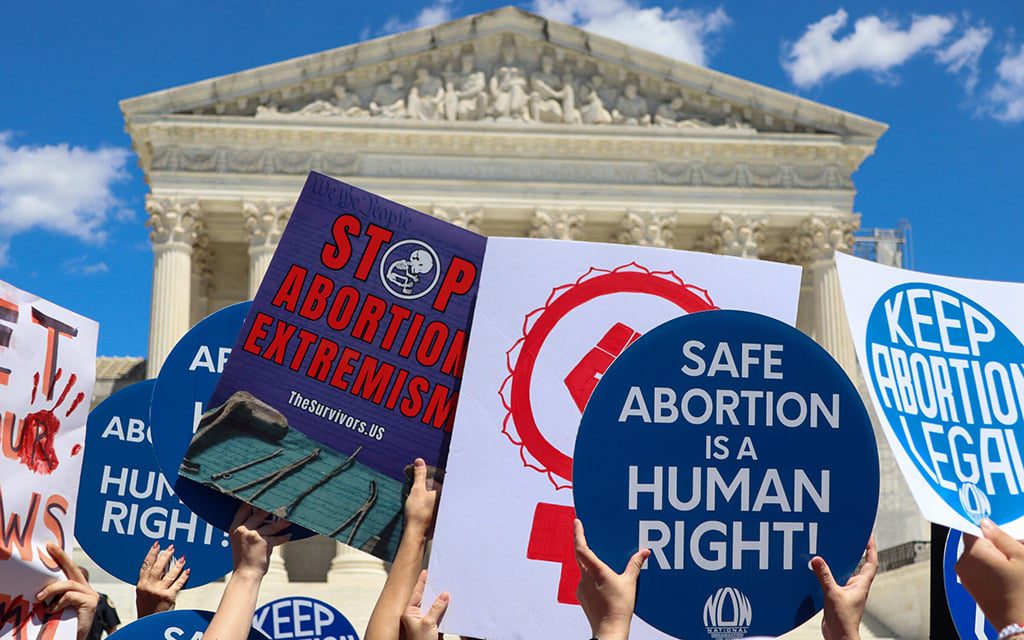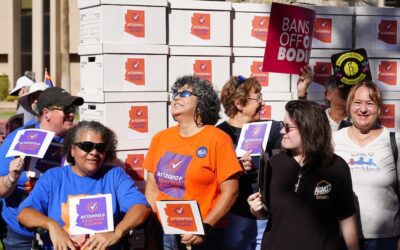
Joanna "Jojo" Sweatt marches with Common Defense, a grassroots organization of progressive veterans, at the Ahwatukee Rotary Club Easter parade in Phoenix, Arizona, on April 19, 2025. (Photo courtesy of Joanna "Jojo" Sweatt)
In August, the US Department of Veterans Affairs (VA) announced that it would no longer allow veterans to access abortion care or counseling through the VA health system, complying with a Trump administration reversal of the Biden-era policy that protected access to abortion for veterans across the country.
The Biden administration implemented its policy in 2022, after the US Supreme Court overturned Roe v. Wade, which ended federally protected access to abortion—and led to more than a dozen states implementing abortion bans. Biden’s policy was meant to protect access to abortion for veterans, even those who lived in restrictive states.
“VA’s proposed rule will reinstate the pre-Biden bipartisan policy, bringing the department back in line with historical norms,” a VA spokesperson said in an email.
The move will block VA medical providers from offering abortion services or covering them with VA medical benefits, even in instances of rape or incest. The only exception is in narrow cases to save the life of a pregnant veteran.
Want Arizona news in your inbox each morning? Sign up for our free newsletter.
Hundreds of thousands of veterans in states with abortion bans will lose access to abortion care and counseling, while service members in states where abortion is legally protected will lose access to abortion care through the VA.
More than 400,000 women veterans are estimated to live in states with total abortion bans or severe restrictions, who may not be able to access the full spectrum of care, whether it is in case of an emergency if at all.
“Prior to the Biden Administration’s politically motivated change in 2022, federal law and longstanding precedent across Democrat and Republican administrations prevented VA from providing abortions and abortion counseling,” the VA spokesperson added.
But, the change only makes life harder for female servicemembers and veterans, who have already been fighting for a more equitable place in the military, said Joanna “Jojo” Sweatt, a Marine Corps veteran, co-founder of Arizona VetsForward, and national organizing director for Common Defense.
“We had made many strides in the last 20 years that I have been very proud of as a woman veteran looking on the outside now that now we’re seeing stripped away,” Sweatt said.
Access to reproductive care is something she has struggled with throughout her military career, and she sees this move by the Trump administration as a continued erasure of women from the military.
“This administration has a direct vendetta against women, and would prefer women to not take stock in the places that they have, like the United States military,” Sweatt said.
Sweatt became pregnant while in the Marine Corps after being denied a tubal ligation by a military doctor for being “too young.” Without access to abortion care, she would not have been able to continue to serve in the military or raise a healthy family on her own terms.
Later, Sweatt suffered an ectopic pregnancy after returning from a deployment in Iraq. “If I couldn’t have accessed an abortion at that time…I might not be here today,” she said.
Sweatt went to a Planned Parenthood to get care for both abortions, and, during a time when there were no abortion bans, she still faced barriers, needing to pay out of pocket and navigate military leave.
The “One Big Beautiful Bill Act” that Trump signed into law in July included a provision that defunds Planned Parenthood, putting as many as 200 health centers at risk of closure, blocking a resource for many servicemembers like Sweatt who have been forced to seek an abortion outside of the military health care system.
READ MORE: House GOP fast-tracks budget bill that would cut off Medicaid funding to Planned Parenthood
Active duty service members can’t take off for several days for no reason, the military requires documentation of travel, including mileage, destination, and mode of transportation—leaving post to get abortion care isn’t quick or easy, Sweatt said.
What’s more, one in three women veterans have experienced military sexual trauma (MST), including sexual assault, during their military service—a crisis that can lead to unwanted pregnancies.
“Women need to be able to make a decision for themselves immediately after being assaulted,” Sweatt said. “Now, our doctors don’t have the autonomy to treat us right then and there based on what’s the best outcome for me and for me to continue to live, instead, I become second to whatever I may be growing inside of me, and that just doesn’t seem like the right way to assess the situation.”
Moving backwards
Sylvia Andersh, an Air Force veteran and Tucson resident, was also a VA medical professional and military spouse for 20 years following her service.
Andersh had an abortion in 1978 while she was on active duty stationed at March Air Force Base in Riverside, California—she had to go to a private clinic rather than the military hospital.
“It was the worst time in my life,” Andersh said. She was within a month of getting out of the military and looking for a civilian job while studying for nursing board exams, while her husband at the time was in college.
“We had plans to try to finish our careers and move forward and have the American Dream,” Andersh said. “[When I found out I was pregnant] I just started crying, I was like, I can’t do this right now, I can’t, there’s just too much on my plate, I’m not ready.”
Fifteen years later, Andersh experienced a miscarriage and needed an abortion. She was told by doctors at a military hospital on base that she had to wait until she started bleeding for them to treat her. Once she started bleeding, she received immediate care.
Now, Andersh has a son and daughter.
Andersh sees Trump’s VA abortion ban as a move backwards for female veterans’ rights, and a step towards a nationwide abortion ban.
“They always start with the vulnerable first, and then they move on to the larger picture,” she said. “It’s intended to make women get out of the military, it is intended to suppress women’s rights and women’s ability to do what they want to do.”
With VA abortion protected, Andersh felt that female service members and veterans were finally starting to be recognized as having different health needs than their male counterparts.
“We thought we’d won this battle and that we were, you know, we were moving forward for women’s rights,” Andersh said. “Now they’ve just cut it off at the knees.”
Support Our Cause
Thank you for taking the time to read our work. Before you go, we hope you'll consider supporting our values-driven journalism, which has always strived to make clear what's really at stake for Arizonans and our future.
Since day one, our goal here at The Copper Courier has always been to empower people across the state with fact-based news and information. We believe that when people are armed with knowledge about what's happening in their local, state, and federal governments—including who is working on their behalf and who is actively trying to block efforts aimed at improving the daily lives of Arizona families—they will be inspired to become civically engaged.


Planned Parenthood suspends Medicaid services, citing ‘Big Beautiful Bill’ restrictions
Planned Parenthood Arizona (PPAZ) announced on Sept. 29 that as of Oct. 1 it can’t accept patients who rely on the Arizona Health Care Cost...

Travel time rose post-Dobbs in states limiting abortion, with AZ seeing surge from Texas
WASHINGTON – In 14 states that made abortion all but impossible to obtain after the Supreme Court overturned Roe v. Wade, women seeking to end a...

In AZ, other states where voters backed abortion rights after Dobbs, legal fights persist
PHOENIX – Voters approved ballot measures protecting abortion rights in seven states last fall. Similar measures failed in three others. But the...

Opinion: What Arizonans can learn from Brazil’s near-total abortion ban
"Neither imprisoned nor dead." This is the powerful translation of Nem Presa, Nem Morta, the name of an advocacy organization that is leading the...





